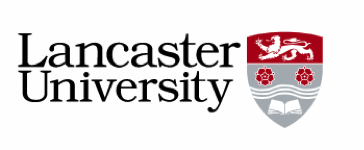Note You are currently viewing a previous version of this narrative statement as published in previous iterations of the KEF (KEF1 and KEF2). View the latest version
Institutional Context
Summary
Since its foundation in 1964, Lancaster University’s institutional strategy has placed equivalence on research, education and engagement. This three-pillar approach persists unchanged. Consistently ranked in the top 10 UK HEIs and top 130 globally, Lancaster reaches beyond deep local and regional impact into wider national and international appositeness. Lancaster’s hard-won reputation as a research-intensive institution is balanced by its high educational standards and its respected position as an innovative and effective catalyst for change. Lancaster focuses on key societal challenges and specialises in multi- and inter-disciplinary innovative engagement. As an anchor institution, Lancaster is an active facilitator and enabler for securing opportunities that benefit its various communities by prioritising quality and effectiveness of its solutions over quantity.
Institutional context
Lancaster University contributes to societal, cultural and economic development at local, national and global levels, engaging actively with partners to support innovation through knowledge exchange (KE) and collaborations that add mutual value. The University employs over 130 KE professionals, enabling agile integration across the full spectrum of university operations.
All KE staff are employed under a “One Lancaster” approach, facilitating greater responsiveness to emerging challenges, via deployment of collective expertise. As a further development and investment in our strategy, a Pro-Vice-Chancellor for Engagement post was established in 2018, with a portfolio that overlaps with enterprise, research and teaching, to consolidate academic linkage and strategic oversight.
The One Lancaster team oversees the KE agenda, ensuring it is a mainstream institutional activity. Our predominantly rural hinterland has driven our focus on supporting innovation, productivity and growth of Small and Medium Sized Enterprises (SMEs) in direct alignment with regional and national Industrial Strategy priorities. Despite both SME engagement and use of European Structural Funds being viewed across the sector as notoriously difficult to manage and align with academic priorities particularly in research intensive universities, Lancaster excels in this area.
Key focus areas include:
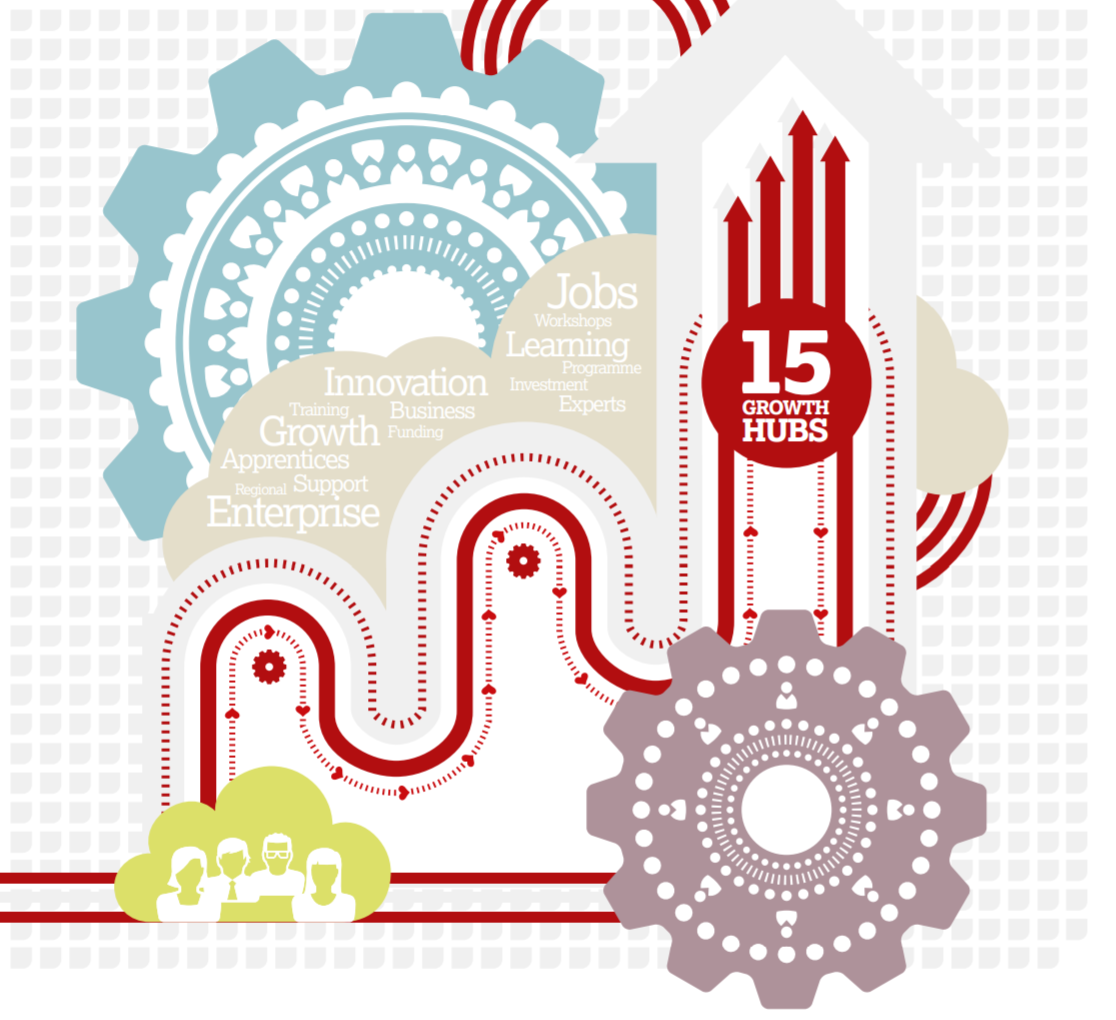 |
Wave 2 Growth Hubs |
|---|---|
 |
The Work Foundation |
 |
UA92 |
 |
Eden Project North |
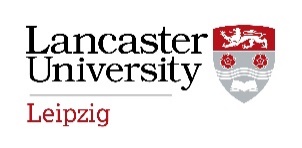 |
Leipzig Campus |
A suite of business innovation collaboration programmes worth > £100M and returning £28 of additional economic investment for every £1 of public funding. Co-designed with regional Local Enterprise Partnerships, corporate, HE and FE partners, they address Industrial Strategy priority areas including productivity, healthcare innovation, clean and sustainable growth and cyber security.
Building on Strategic Alliances with local authorities, FE colleges and large industrial partners in the region to unite the local community, trigger economic regeneration and enhance educational provision.
The University embraces ‘big bold bids’ including Government partnership to deliver the highly successful ‘Wave 2 City Growth Hubs’, our founding role in Eden Project North and in opportunities including UA92 and strategic overseas campuses.
Implementation of an IP policy where IP is used to build relationships with external organisations to generate further collaborative and contract research opportunities and incentivises academic engagement.
An innovative consultancy service that has seen a thirty-fold increase in contracted work in the first year of operation.
A range of Research Council Impact Acceleration Accounts have embedded a deep-rooted KE culture within academic staff, by enabling new – and sustaining existing – external relationships.
Co-location of over 40 organisations in dedicated office and laboratory spaces across our campus, from sectors related to health, digital, clean growth and smart materials. The close physical proximity to researchers and KE staff enables deep collaboration and is enhanced through our new £41m Health Innovation Campus.
Our presence in London via The Work Foundation further enables our knowledge exchange with policy makers.
Lancaster University’s students and staff are our catalysts for positive change: we are proud of our extensive use of undergraduate and graduate talent to enable KE collaborations, enhance employability, and retain expertise regionally; and we reward academic KE activity via bespoke engagement-based promotions criteria and annual staff awards.
For further information, please send queries to KEF@lancaster.ac.uk
Local Growth and Regeneration
Summary of approach
Lancaster University’s vision of being a globally significant university is entirely consistent with our concomitant civic responsibility as a local anchor institution focussed on facilitating regional economic and societal change. Partnership and collaboration are core to Lancaster University’s operational ethos and our industrial hinterland has unquestionably driven our focus on integration with regional SMEs. Through this symbiotic partnership, we contribute actively to societal, cultural and economic development by engaging with partners to support innovation through KE collaborations that are mutually beneficial. Our published Strategic Plan reinforces our commitment to “Lead on renewal and growth of our local community to create value for Lancaster and the North West region, including the enhancement of cultural assets, physical infrastructure, health and economic development”.
Aspect 1: Strategy
Lancaster University’s approach to local growth is tailored to support SMEs in the region. Unusually for a top 10-ranked, research-intensive university, this approach was a deliberate decision to focus on connecting our academic strengths in alignment with the structure of our region and tailored to the needs of our local economies. This SME-centred strategy has delivered benefits beyond the region, with positive and measurable impacts across the UK, Europe, Africa and Asia.
By becoming ‘business as usual’, this approach has allowed us to harness our undergraduate and graduate talent to provide the necessary absorptive capacity to facilitate these collaborations, whilst enhancing graduate employability and retention in our region. This is key to our strategic approach and essential to the locality, given productivity in both Lancashire and Cumbria is approximately 15% below the UK average, caused by, and in turn compounding, a legacy of skills gaps in key sectors and relatively low levels of innovation and entrepreneurship. SMEs that employ fewer than 50 people constitute >98% of all businesses in Cumbria and Lancashire, meaning that SME growth and sustainability have a major impact on regional employment and prosperity.
Lancaster University began deep and broad engagement with its local SME community in 1998, following an initial £200,000 European Regional Development Fund (ERDF) grant to support 40 Lancashire-based businesses. Lancaster is now recognised as a national exemplar in driving SME innovation-led growth. We have supported over 10,000 SMEs, creating/safeguarding more than 16,000 jobs, thereby achieving significant economic and social impact regionally and nationally.
Mirroring our institutional Strategic Plan, our Knowledge Exchange Strategy outlines SMEs and regional sustainable growth as a priority objective. As a result, we continue to exert a disproportionately positive impact and influence on regional business innovation and economic growth, in collaboration with Lancashire, Cumbria and broader North West (NW) Local Enterprise Partnerships (LEPs).
Since 2016, Lancaster University has been awarded a series of business innovation collaboration programmes worth >£100M and covering Industrial Strategy priority areas, including productivity (particularly in advanced manufacturing SME supply chains), leadership and management, clean and sustainable growth, and the digital economy. These programmes directly support the national 2.4% R&D and levelling-up priorities and agendas. Collaborating with other NW HEIs, by 2023 Lancaster University will have supported a further 3,000 SMEs across the region (Figure 1 shows those supported to date).
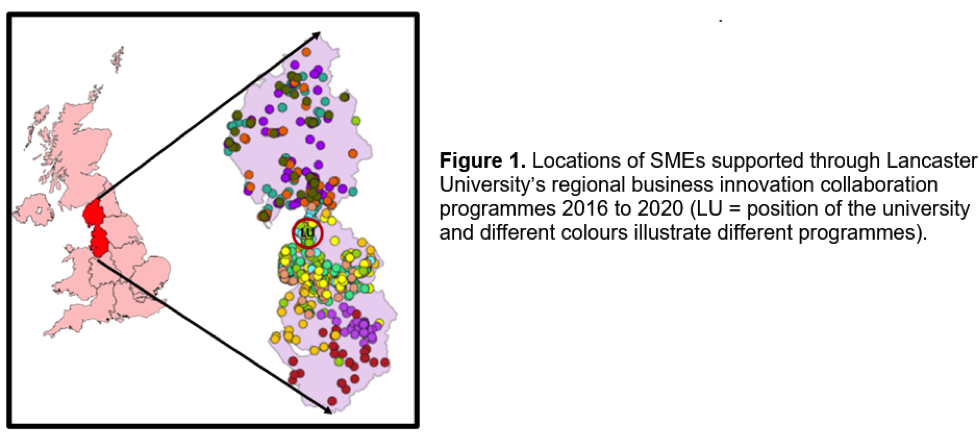
Building from this SME-focus we collaborate with regional corporate businesses to support regional supply chain productivity and resilience, and with Government (BEIS and Cabinet Office) through programmes including the £32M ‘Wave2 Growth Hubs’ programme and our work with ‘Be the Business’ on the ‘Made Smarter’ NW pilot. We are developing a signature approach through targeting big bold regional initiatives including Eden North and Net Zero North.
 |
Wave2 (City) Growth Hubs |
Aspect 2: Activity
Lancaster University collaborates with all five Northwest LEPs to ensure activities align to their economic, skills- and innovation-related plans. This includes supporting the development and delivery of Local Industrial Strategies (LIS) for Lancashire and Cumbria. We have a seat on key Lancashire LEP Boards and the NW Business Leadership Team and are an active member of the N8 universities partnership.
We have developed strategic alliances with local authority, HEI, FE college and industrial partners, and we have confirmed our commitment to our local communities through the Civic University Agreement.
Lancaster University is the only UK university to lead two Science and Innovation Audits (SIAs) – focussed on Advanced Manufacturing Productivity and Clean and Sustainable Growth. The resulting collaboration with regional industrial partners, LEPs, HEIs and FE colleges has enabled us to further deliver regional, national and international benefits through identifying areas of potential global competitive advantage. We use the SIAs to inform our own evidence-based approach to both local growth and global influence.
Specific examples of our activities include:
Lancashire Universities’ Innovation Manager (LUIM)
The LUIM role was created in partnership with the universities of Central Lancashire and Edge Hill to enable a more strategic approach to our collaboration with the Lancashire LEP.
Initiatives include:
policy guidance for the development of the Lancashire LIS, alongside the LEP and BEIS, including the creation of an Innovation Board to execute innovation plans
securing funding to enable LIS development (for both Lancashire and Cumbria LEPs) using expertise within the Lancaster University Management School (LUMS) to drive an innovation ecosystem approach
leading the collaboration between Lancashire, Cheshire and Cumbria LEPs to develop a joint project through the Massachusetts Institute of Technology Regional Entrepreneurial Acceleration Programme (MIT-REAP), as one of only six regions invited by BEIS to participate in the pilot aimed at developing place-based levelling-up programmes.
Supporting Productivity and Advanced Manufacturing
We have built on the recommendations of the Advanced Manufacturing SIA, co-led with Sheffield University, which addressed the role of our innovation base in driving the adoption of Industrial Digitalisation Technologies (IDTs) to improve regional productivity. LUMS collaborates with the Government’s ‘Be the Business’ campaign and we are the lead university in the development of the Productivity through People (PtP) Programme focused on developing the leadership capacity of advanced manufacturing SME owner-managers. Delivered in partnership with BAE Systems, Rolls Royce and Siemens, >70 NW SMEs have been supported thus far and Lancaster has facilitated a national roll-out with partner universities Bath, Aston and Strathclyde. LUMS has been selected to deliver the ‘Made Smarter NW Pilot Leadership and Management Programme’, specifically designed for advanced manufacturing SME owner-managers wanting to improve productivity through IDTs adoption.
 |
SIA Wave 1 Reports |
|---|---|
 |
Productivity Through People |
 |
Made Smarter North West |
Supporting Clean and Sustainable Growth
The Centre for Global Eco-innovation (CGE) led by the Lancaster Environment Centre (LEC) represents a nationally leading initiative in SME partnership-working for sustainable innovation and clean growth. Since 2012 it has engaged with more than 700 SMEs across the NW, enabling them to access world-leading research expertise, facilities and international partnerships. It has supported more than 100 PhD and 50 MRes studentships across a range of domains. Through ‘thinking globally and acting locally’, CGE has successfully co-delivered the place-based eco-innovation model in international contexts through the success of the pan-African Global Challenges Research Fund (GCRF) supported RECIRCULATE project.
Eco-I North West is a new, £14M programme delivered by CGE that will work with more than 360 businesses across Lancashire, Liverpool City Region, Cumbria, Cheshire and Greater Manchester to support R&D-led innovation in clean growth technologies, products and services to drive a green economic recovery. Viewed as a pilot for future UK Shared Prosperity Fund (UKSPF) opportunities, the project is led by Lancaster in collaboration with five NW based universities. The programme will enable businesses across the NW to capitalise on the region’s knowledge base and research talent through 70 PhD and MRes studentships. The environmental impacts of these initiatives are as significant as the economic ones. For example, the original CGE ERDF programme saved an estimated 27,000 tonnes CO2 equivalent, 78,000 tonnes of water use and 60,000 of materials use.
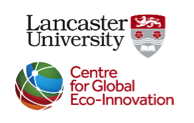 |
Centre for Global Eco-innovation |
|---|---|
 |
RECIRCULATE |
 |
North West Coastal Arc Partnership’s SIA |
The project builds on evidence identified in the North West Coastal Arc Partnership’s SIA, which identified significant global growth opportunities for businesses across all sectors resulting from a low carbon economy. Eco-I North West will operate to deliver low carbon innovation to all sectors and will increase the awareness, capacity and appetite of SME leaders to embrace the opportunities that research and development in clean growth can bring to their business. We are a member of the N8 ‘Net Zero North’, a significant funding proposal to Government focused on driving the national Green Recovery from our region.
We are the lead academic partner with Eden Project International on the development of ‘Eden Project North’ in Morecambe. This will be an internationally significant, research-led visitor attraction (over 1M expected annually) and platform for public engagement with science focused on health and the environment. It represents a unique opportunity to act as an international technology testbed for clean growth innovations and will have a significant impact on the levelling-up agenda through regeneration and economic growth – for example it is projected to generate over 1,000 jobs in the regional supply chain alone.
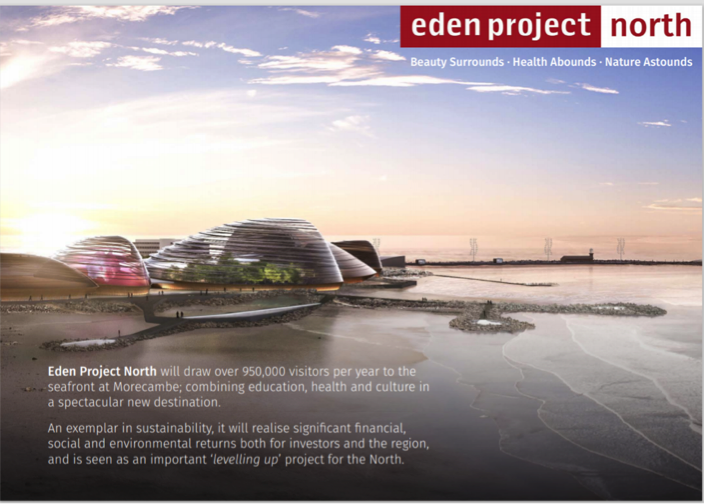
Supporting Health Innovation
The £41m, 8,000m2 Phase 1 of our Health Innovation Campus (HIC) has recently opened, co-locating our Faculty of Health and Medicine alongside businesses and collaboration facilities. Recently the HIC team worked with the LUIM and industry partners to create the COVID-19 Manufacturing Cluster for Lancashire and South Cumbria. This service connects NHS and other frontline healthcare providers with local manufacturers to procure products that are essential to the COVID-19 response, including masks and ventilators., and operates as a precursor to future diversification into the health sector.
The HIC team, in partnership with LUMS colleagues, has also developed a peer-learning COVID-19 Recovery and Resilience online programme to support SME leaders in Cumbria and Lancashire to re-shape their business, innovate, survive and thrive following the pandemic.
 |
Health Innovation |
|---|---|
 |
COVID19 Cluster |
|
LUMS' COVID19 Response Programme |
Supporting the Digital Economy
In 2019 Lancaster secured £1.5M from Research England to establish a Secure Digitalisation University Enterprise Zone (SecureD UEZ), building on partnerships including those with BAE Systems and GCHQ and expertise within our Academic Centre of Excellence in Cyber Security. Funding enabled a Secure Digitalisation Accelerator Programme to support companies in adopting Industrial Digitisation Technologies (IDTs) securely, a new suite of world-class secure digital fabrication equipment, and secure data handling facilities (leveraging internal and philanthropic investment). The UEZ extends across the whole campus (including the HIC, given the importance of secure data sets for the NHS) and the White Cross Business Park in Lancaster, strengthening links between campus activities and the city.
We partner with Manchester universities on the £6M Greater Manchester Cyber Foundry project to support SMEs to develop new cybersecurity-based products and services. A complementary programme in Lancashire is also being delivered. This work has enabled a recent bid to establish a Digital Security Innovation Hub at GCHQ’s Manchester office, alongside Barclays and Manchester University.
|
SecureD UEZ |
|---|---|
|
Manchester Cyber Foundry |
|
Lancashire Cyber Foundry |
Aspect 3
In 2019, Lancaster University commissioned an independent economic evaluation of our business innovation collaboration programmes funded through European Structural and Investment Funds (ESIF). Almost 200 SMEs were surveyed to assess the impact of the support they had received from the University. The evaluation provided us with an independent assessment of our work, whether our offer was fit for purpose and represented perceived and measurable value for both beneficiaries and funders. Table 1 shows the impacts achieved from 2016 to June 2019 and forecasted impacts to December 2023, across all programmes.

By December 2023, the average impact per beneficiary SME is forecast to be:
2.6 net jobs created/safeguarded
£353,015 net uplift in turnover
increased net profit of £68,854.
The evaluation also examined the beneficiary experiences as well as the economic impacts:
99% agreed delivery approaches were fit for purpose
96% were happy overall with the support provided
96% stated they received high-quality advice.
Beneficiaries were asked what the biggest impact of participation had been on their business, in their own words (responses are shown in Figure 2). Common responses focused on benefits arising from ‘networking’, ‘peer support’, ‘increased confidence’ as well as via securing ‘support and advice’ and ‘new knowledge’.
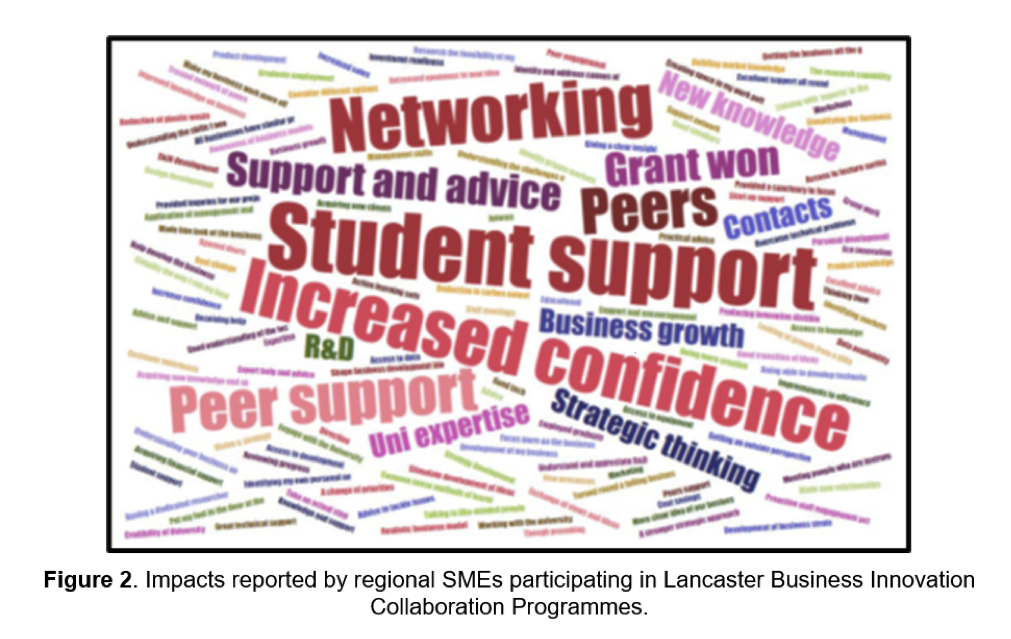
The evaluation also considered emerging themes and the potential to improve approaches in the future. This is important not only to inform extensions of our existing programmes, but also to underpin conversations with our regional LEPs around ESIF-successor funding schemes such as the proposed UK Shared Prosperity Fund. This will help to ensure Lancaster University further evolves our civic role as a regional anchor institution and continues to impact positively on local growth and regeneration across Lancashire, the wider NW and beyond.
Direct quotes from participants in these programmes appear below and show the wide range of positive effects experienced as a result of collaborating with Lancaster University.
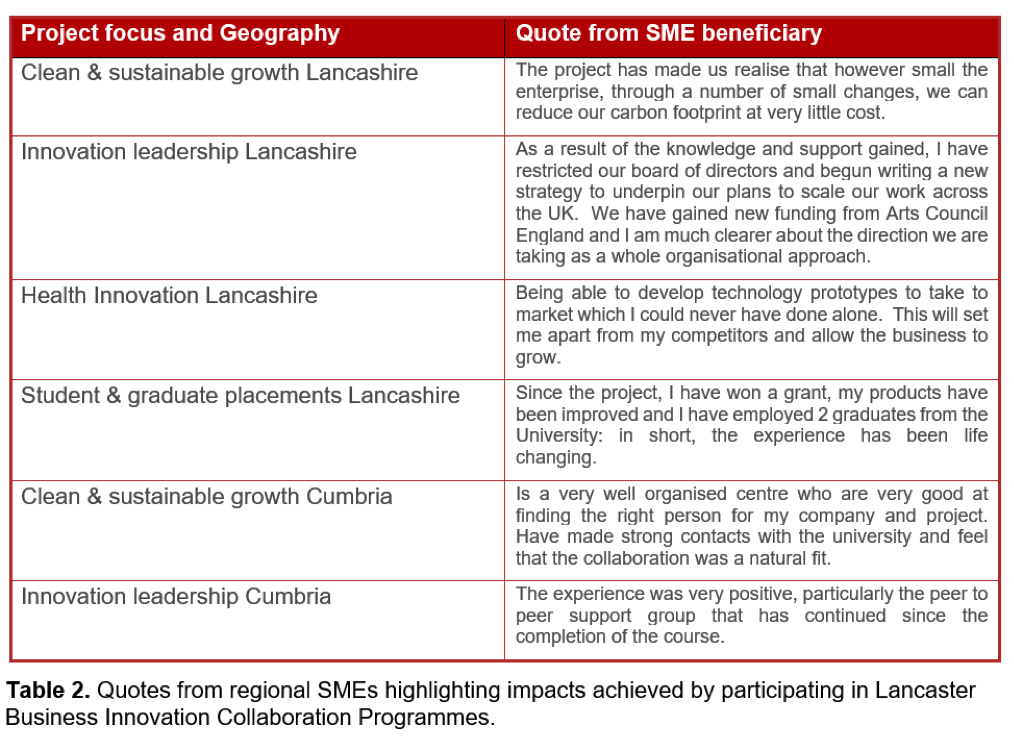
|
Lancaster University - SME Impacts |
For further information, please send queries to d.williams2@lancaster.ac.uk
Public & Community Engagement
Summary of approach
Since its inception, Lancaster University’s institutional strategy has placed equivalence on engagement, education and research. We are embedded within a full range of local, regional, national and international communities whilst participating in, and driving, sustainable regional growth and development. The University was an early signatory to the Civic University Agreement programme and the NCCPE Manifesto for Public Engagement.
Since 2013, a sharpened focus on engagement includes building innovative, interdependent relationships with key partners and civic leaders to understand needs and contribute expertise and resources for economic, cultural and societal benefit; supporting public and community engagement related to, and driven by, research and education; encouraging community access to our teaching, research and social facilities and assets; and embedding an engagement culture.
Aspect 1: Strategy
Strategy
Lancaster University’s strategy sets out a commitment to Engagement as one of three equivalent priorities, to engage actively with our students, staff, businesses and communities.
https://www.lancaster.ac.uk/strategic-planning-and-governance/strategic-plan/
The University achieves this through a stakeholder-informed approach including:
 |
The Lancaster Exchange |
|---|---|
 |
University and college collaboration |
 |
Health, social care education and research in Blackpool |
community and stakeholder views gathered via market research and the annual Lancaster Exchange
trusted relationships with partner organisations, underpinned by shared aims set in formal Agreements
staff input gathered via departmental and faculty engagement strategies and facilitated all-staff ‘Big Conversations’ on topics including sustainability and the Eden Project North.
The University supports staff representation on a range of external bodies and community groups, including local NHS Trusts, Chambers of Commerce, Schools and creative organisations, resulting in stronger relationships and a better understanding of local needs.
Leadership and Governance
The Pro-Vice-Chancellor Engagement (PVC-E) and Associate Dean for Enterprise and Engagement formally lead institutional engagement, supported by four Faculty Associate Deans and 28 engagement leads from academic departments. The Engagement Advisory Group oversees and advises on the University’s engagement strategy.
The Arts Strategy Committee oversees cultural provision, with specific committees providing leadership for Lancaster Arts and the Ruskin, drawing on internal and external membership and expertise to shape their engagement activity.
Resources
Professional Services support is provided centrally and in faculties to facilitate public engagement activity, including via public events, and the media, schools engagement and student community engagement. The PVC-E and Head of Stakeholder Relations are the contact points for key civic organisations and community groups. During COVID-19, all requests are channelled via this route to ensure effective and timely responses.
 |
Beyond imagination |
|---|---|
 |
H-unique |
 |
Recirculate |
In support of this activity, a range of external funding has been awarded including:
Over £18m of highly competitive grants for research projects since 2018 including Beyond Imagination E3, Future Places, H-Unique and Recirculate, all embedding public engagement from local to global levels
£1m ESRC Impact Acceleration Accounts supporting engagement with the social sciences
HEIF investment to support the development of Community and Business Partnerships
£8m (HLF) to purchase the Ruskin Whitehouse Collection
£105k annual Arts Council England NPO funding.
Aspect 2: Support
In 2018, a dedicated PVC Engagement was appointed, providing strategic leadership and focus, with aligned professional services support. Practical support is provided to academic staff to engage the public with Lancaster’s research and teaching. This includes intensive media training, copy writing and social media support, facilitating opportunities to participate in public events, exhibitions and festivals, and engaging young people in science and the social sciences.
Funding for public and community engagement includes:
Academic-led public engagement activities
Wind Turbine Community Fund
Impact Accelerations Accounts
Partnership with the local Dukes theatre.
The University delivers training and development for researchers, including aspects of impact and engagement, with a dedicated session on public and community engagement. Ad hoc training is also provided, for example ‘Bright Club’, supporting academics to share their research through comedy.
Over 400 student volunteers receive safeguarding and bespoke training each year to support a range of community and schools engagement activities.
Recognition and reward
The University has several mechanisms by which it recognises and rewards staff engagement, including a pathway for engagement which enables promotion and progression for academic staff. The ‘Lancaster Award’ recognises the extracurricular activity undertaken by students, including volunteering. Recent winners of Lancaster University staff awards have included colleagues nominated for their work with schools, teachers and the local community.
Aspect 3: Activity
The consultation processes set out above provide insight into community and stakeholder needs which include collaboration as both partner and facilitator, developing cultural assets and providing community access to our research and facilities. These, together with academic-led public engagement, have informed the focus of the University’s approach and examples are outlined below.
Working collaboratively with partners
 |
Eden Project North |
|---|---|
 |
Lancaster Castle |
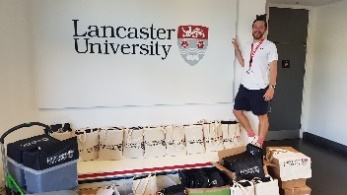 |
Connecting kids |
Lancaster University is a founding partner of Eden Project North (EPN). As part of the EPN Education Strategy, a Learning Hub was established in Lancaster & Morecambe College (LMC) and, with the support of Lancaster University, LMC is facilitating the strategic reform of an integrated education offer across Morecambe Bay. EPN and Lancaster University, in partnership with schools and FE Colleges in the area, lead the co-creation of the place-based Morecambe Bay Curriculum (MBC), covering early years through to higher education, led by the Eden chair for Education and Engagement.
The impact of COVID-19 on the community of Morecambe highlighted deep-seated social, economic, health and education challenges, including lack of food, social isolation, psychological and physical health concerns and access to education. In response, Lancaster University facilitated the Connecting Kids project, connecting vulnerable children and young people with education during lockdown.
In partnership with the Duchy of Lancaster, we have opened a learning and engagement venue in Lancaster Castle to strengthen connections with the community.
Developing cultural assets
 |
Lancaster Arts Autumn 2020 |
|---|---|
 |
The Ruskin |
 |
Peter Scott Gallery |
Lancaster Arts, part of the Arts Council England portfolio, is the University's established arts provider, supporting engagement through programmes of contemporary theatre, dance, visual art and classical music on campus and across the city in libraries, museums and public spaces. Lancaster Arts has both a local and global focus, working with locally-based and international artists, whilst nurturing partnerships with academics through their commissioning programme.
‘The Ruskin’ is home to The Ruskin Whitehouse Collection (John Ruskin 1819-1900). Purchased in 2019, with £8m leveraged on a vision of increased public engagement and academic enquiry, the collection was relaunched with immersive exhibitions, a programme of talks and performances and special events for family and student audiences, events in BSL and Mandarin Chinese, and workshops for learners from primary school to continuing education.
Academic-led public engagement
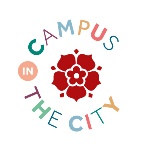 |
Campus in the city |
|---|---|
 |
Light up Lancaster |
 |
Festival of Social Science |
 |
Sex, bugs & rock 'n roll |
There is a rich tapestry of academic-led public engagement activity relating to teaching and/or driven by research. Examples include:
The research-led development of the public engagement tool, ‘Leapfrog’, supporting wider capacity building in communities, especially around health. A version is freely available from www.Leapfrog.tools.
Physics public engagement programme to foster better societal understanding of science, reached a global audience with exhibits on quantum technology at an unprecedented three successive Royal Society Summer Science (RS SSE) Exhibitions (2017-2019) and New Scientist Live in 2018.
H-unique, a major research project with public engagement embedded in its design, with a call for 5,000 ‘citizen scientists’ to contribute images to the world’s first searchable database of anatomical variations in the hand.
Expertise in public and patient engagement in health and social care research, including recent prize-winning work to co-design research approaches, with children and young people, to embed public health interventions as part of Paediatric Emergency Department attendances.
The GCRF-funded RECIRCULATE, using eco-innovation and partnership-based approaches in Africa to build capacity for a safe circular water economy.
Students are supported to engage with the public and communities e.g. through charity-based internships and projects, and school mentoring programmes.
Academics are supported to participate in a wide range of free public and community engagement events, providing opportunities to learn about, and participate in, research. Activities include public lectures, “Campus in the City”, masterclasses, and local and national events such as ‘Light up Lancaster’, Festival of Social Science and “Sex, Bugs & Rock ‘n’ Roll” at Glastonbury.
Accessing facilities
A wide range of community groups including sports clubs, disability groups, national governing bodies, the Police Association and youth organisations use our Sports and campus facilities. The introduction of the Human Performance Lab and other facilities enabled collaboration with Morecambe Football Club to support team development.
Aspect 4: Results and learning
In 2018/19, almost 280,000 people participated in public and community engagement activities and 17,000 participated in performance arts, exhibitions and museum education (HEBCI Survey). Several evaluation measures are used to assess outcomes and inform future activity and examples include:
* The graphs show data reported in Table 5 of the HEBCI Survey which included conferences, festivals, on-line courses, media, masterclasses and schools engagement.
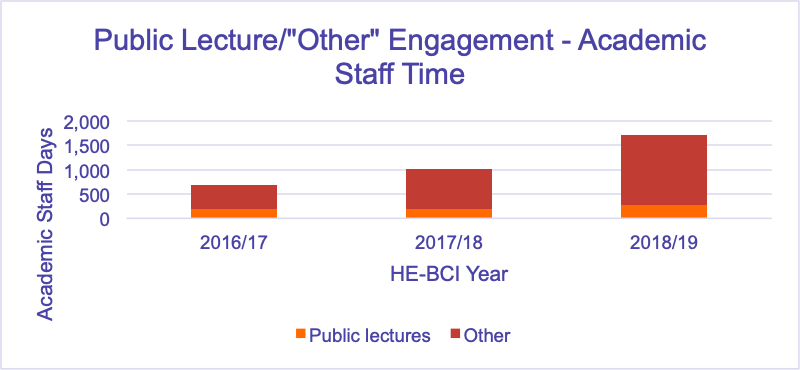
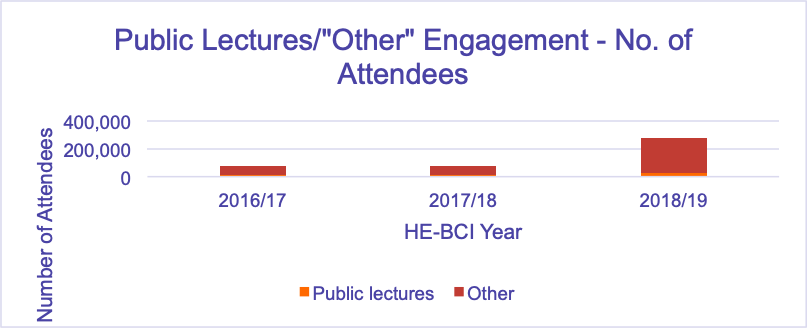
Public domain data relating to LMC highlights the positive impact of the EPN partnership on the development of the education offer within the area: Lancaster and Morecambe College - Ofsted Inspection March 2020 - Grade: GOOD.
“The principal and senior leadership team have established strong and sustainable relationships with a wide range of community organisations and leaders … The college is a strategic partner in the Eden Project North. This project is driving a whole-education system change across the area. The college has established itself at the centre of this change.”
Connecting Kids – COVID-19 responseOver £130k raised. 486 laptops, internet access, learning resources and over 2,000 activity packs provided. Feedback being collated from young people, schools and community groups via interviews and questionnaires. A mentoring pilot completed, with pupil and teacher feedback informing a wider roll-out. “Getting a new laptop and proper internet connection has been life changing… He’s been able to do the work set by his teachers … I know it’s not as good as being in school and in his lessons, but he has become more motivated and independent”.
Parent, Central High School, Lancaster.
Cultural programme (Lancaster Arts and The Ruskin)Outcomes are reported to funders against agreed KPIs including numerical data, surveys and artistic assessment. Creative Gatherings (comprising local residents, volunteers, artists, public sector professionals, students and academics) inform programme content.Research engagement‘Leapfrog’ website viewed over 100,000 times from 146 countries with over 5,000 tool downloads.
≥96% of teachers visiting RS SSE between 2017-2019 agreed they had learnt new scientific knowledge; combined media coverage reached 118m
H-Unique. Over 180 print/digital outlets covered the project with a combined reach of more than 106m. Over 3,000 citizen scientists have participated.
135 organisations from 15 countries attended Recirculate workshops; 320 attendees at capacity-building workshops in Africa (total 1310 training days)
Qualitative and quantitative data are gathered through physical and online surveys, for example:
96% attendees who responded learned something new at public lectures and other events
63% academic participants made new connections and/or collaborations.
In 2019, over 25,000 people from 187 countries participated in eight MOOCs including Corpus Linguistics, Soils, Palliative Care and Lancaster Castle.
During the pandemic, over 3,500 community participants benefited from online training on topics including how to use ‘Teams’.
Media EngagementIn 2019, Lancaster academics reached a global audience of 616.6M through 400 TV appearances and 417 Radio broadcasts. Academics contributed to the influential blogging site ‘The Conversation’, generating nearly 5.2M reads.Aspect 5: Acting on results
The activities and outcomes highlighted in Aspects 3 and 4 are reviewed and communicated in a variety of ways, responding to the needs and interests of different stakeholder groups. For example, cultural activities are reported to funders and Advisory Boards, major research and science outreach projects are communicated widely to a local and global audience via multi-media, and success is celebrated via internal news and awards.
There is a drive to promote a vibrant engagement culture including an engagement-specific promotions and progression pathway containing academic contracts specific to engagement. ‘Big Conversations’ provide an engagement mechanism for important debate, and improved data capture leads to stronger evidence for public and community engagement activities, knowledge exchange priorities, training and support needs.
Responding to the impact of COVID-19, the University is investing time and resources in providing alternative platforms for engagement. For example, Lancaster Arts and The Ruskin have designed specific online content and the public lecture programme, and the Festival of Social Science are also now online. The libraries at Cambridge and Lancaster University have partnered to co-develop and install the Cambridge Digital Library platform to provide digital public access to explore and engage with collections.
The University continues to facilitate opportunities for communities and partners to convey their views and requirements. For example, the evaluation and outcomes of the 2019 Lancaster Exchange helped to shape University strategy and key outcomes were communicated publicly. Partnership working with Lancaster City Council includes academics contributing expertise to the Citizen Jury on Climate Change, and funding bids, including the recently awarded Heritage Action Zone.
For further information, please send queries to sarah.rees@lancaster.ac.uk




